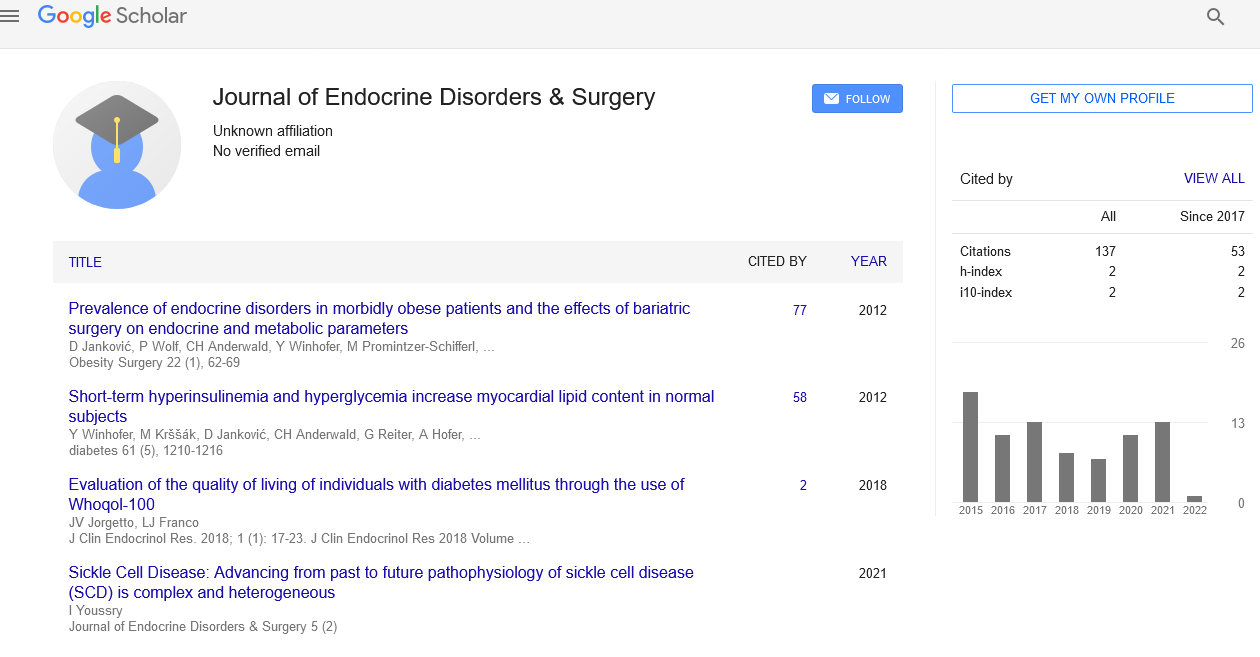Effects of iodine deficiency
Received: 04-Oct-2022, Manuscript No. PULJEDS-23-6199; Editor assigned: 06-Oct-2022, Pre QC No. PULJEDS-23-6199 (PQ); Accepted Date: Oct 25, 2022; Reviewed: 10-Oct-2022 QC No. PULJEDS-23-6199 (Q); Revised: 12-Oct-2022, Manuscript No. PULJEDS-23-6199 (R); Published: 30-Oct-2022, DOI: 10.37532/puljds.2022.6(5).04-05
Citation: James A. Effects of Iodine deficiency. J. Endocr Disord Surg. 2022; 6(5):04.
This open-access article is distributed under the terms of the Creative Commons Attribution Non-Commercial License (CC BY-NC) (http://creativecommons.org/licenses/by-nc/4.0/), which permits reuse, distribution and reproduction of the article, provided that the original work is properly cited and the reuse is restricted to noncommercial purposes. For commercial reuse, contact reprints@pulsus.com
Abstract
Iodine is an essential part of the THs, which are necessary for normal metabolism, growth, and development. To guarantee the best possible growth and development of the foetus, enough iodine intake is essential during pregnancy. Moreover, foetal neurodevelopment during pregnancy depends on proper iodine levels, and mild iodine deficit has been associated to developmental problems.
Keywords
Pregnancy; Thyroxin
Introduction
The increased need for Thyroxin (T4) to maintain a mother's normal overall metabolism, the transfer of T4 and iodide from the mother to the fetus, and the increased loss of iodide through the kidney due to an increase in renal clearance of iodide during pregnancy are the factors that contribute to the increased need for iodine.
Iodated oil injections given in the later half of pregnancy or in other supplemental forms help prevent perinatal death and low birth weight, which rise during pregnancy when there is an iodine deficiency (European Commission, 2002). Iodine shortage during pregnancy is known to affect a fetus's ability to grow and develop normally. According to epidemiological research, hypothyroidism has long-term effects on the brain development of the unborn child, particularly at the beginning of gestation. Comprehensive clinical research has established a link between maternal thyroid insufficiency during pregnancy and a newborn's delayed cognitive development. In fact, endemic cretinism, which is brought on by iodine shortage, is the condition where a thyroid insufficiency causes the most severe brain damage
The primary factor causing brain injury in children is iodine deficiency. It causes delayed cognitive and motor development, which has an impact on a child's academic achievement. It has an impact on adult productivity and employment prospects. Those who lack iodine may lose 15 IQ points, and over 50 million people have some form of brain impairment because of iodine deficiency
Iodine is a critical component in the fetal development process, especially with regard to the brain, so it is especially crucial that pregnant women acquire adequate iodine in their diet. Iodine shortage during pregnancy causes higher perinatal and newborn mortality as well as low birth weight, preterm, and brain impairment to the developing fetus.
Because the brain still requires iodine for growth during the first two years of life, young children are especially at danger. In addition, hypothyroidism and problems with physical and cognitive development in children are caused by iodine shortage.
According to the most recent estimate, 1.88 billion people worldwide, including 241 million school-age children, do not consume enough iodine from their diets. Iodine deficiency affects both established and developing countries equally, despite the fact that it may be more severe in underdeveloped nations.
Iodine deficiency is readily and inexpensively avoidable. Iodizing table salt, which is presently done in many nations, is one of the best and least expensive ways to prevent iodine deficiency disorder. The population's iodine status has significantly improved in areas where salt iodization has been practised for at least a year. A combined diet of maize, peas, torula yeast, and dried iodine-deficient mutton has caused severe iodine deficiency in marmosets. The hair development on the newborn iodine-deficient marmosets was somewhat patchy. With a severe decrease in plasma T4 in both mothers and infants, and being larger in the second pregnancy than the first, the thyroid gland may have been more severely deficient in iodine. The infants from the second pregnancy had a significantly lower brain weight than those from the first, but not by much. The cerebellum's weight and cell count reductions and histological changes suggesting impaired cell acquisition made the findings there more startling. These results show that iodine deficiency has serious impacts on the brains of primates. Iodine shortage in the mother causes iodine deficiency in the developing fetus. Iodine deficiency during pregnancy affects both the mother and the baby' ability to synthesize thyroid hormones. Neurocognitive impairment may occur if the growing brain does not receive enough thyroid hormones. Thyroid hormones play a crucial part in physiology by specifically affecting the rate of cell differentiation and gene expression to ensure that normal growth and development take place. When T3 binds to nuclear receptors, which control the expression of particular genes in various brain regions during fetal and early postnatal life, thyroid hormone activity is affected. The T3 that is attached to nuclear receptors is mainly produced locally inside cells using type II deiodinase instead of being released into the bloodstream.





